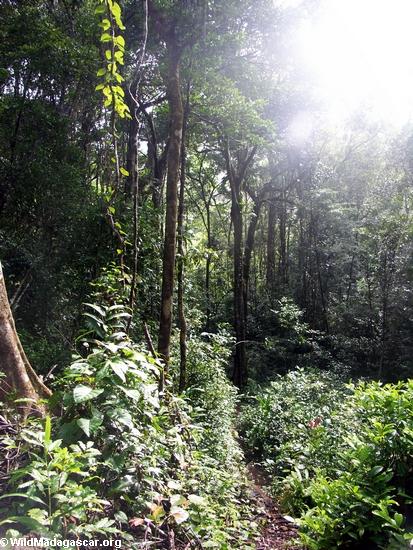|
|
|
|

|
|
Rainforest in Madagascar.
|
EU debates restrictions on illegal timber trade
EU Divided on Plans to Curb Illegal Timber Trade
Tue Dec 21,11:11 AM ET
Reuters
BRUSSELS (Reuters) - EU members are divided over a European Commission (news - web sites) plan to crack down on the lucrative illegal timber trade by making exporters prove their wood is not from endangered rainforests, officials said on Tuesday.
EU farm ministers were discussing a voluntary timber certification system that might lead to a global agreement to clean up the $150 billion global forest product trade.
A key part of Europe's battle against illegal logging is to stop laundered profits being diverted into organized crime.
One way that the Commission, the EU's executive, wants to achieve this is to ensure imports are accompanied by paperwork showing the timber comes from approved forests.
Some EU governments disagree with the idea, and this may delay the project for about one year -- especially as exporting countries would have to agree to certifying their products, and these bilateral arrangement have yet to be negotiated.
Under the plan, once a country or regional bloc has signed up to such an agreement, the EU will refuse to accept imported timber from that state unless it is certified as legal.
"The council (of ministers) seemed to be fairly split," one EU diplomat said. "We may see some progress on this by the start of the UK presidency (of the EU), in July 2005," he said.
Seven countries opposed the certification scheme -- timber producers France, Finland and Austria, plus Britain, Denmark, Sweden and Slovakia.
"The countries that are opposed fear that a certificate of origin would increase their administrative burden, and also say that it wouldn't be efficient," an EU official told reporters.
Environmental groups estimate European imports of illegally felled timber are worth 1.2 billion euros ($1.6 billion) a year, and say the trade can lead to more forest fires and poaching.
The EU is an important market for both legal and illegally harvested timber entering international trade. It is the largest importer of plywood and sawnwood from Africa and the second largest from Asia, as well as a key market for Russia. ($1=.7469 Euro)
Source: REUTERS NEWS SERVICE
CONTENT COPYRIGHT REUTERS NEWS SERVICE. THIS CONTENT IS INTENDED SOLELY FOR EDUCATIONAL PURPOSES.
mongabay.com users agree to the following as a condition for use of this material:
This site contains copyrighted material the use of which has not always been authorized by the copyright owner. Such material is made available in an effort to advance understanding of environmental issues. This constitutes 'fair use' of any such copyrighted material as provided for in section 107 of the US Copyright Law. In accordance with Title 17 U.S.C. Section 107, the material on this site is distributed without profit. If you wish to use copyrighted material from this site for purposes of your own that go beyond 'fair use', you must obtain permission from the copyright owner.
If you are the copyright owner and would like this content removed from mongabay.com, please contact me.
|